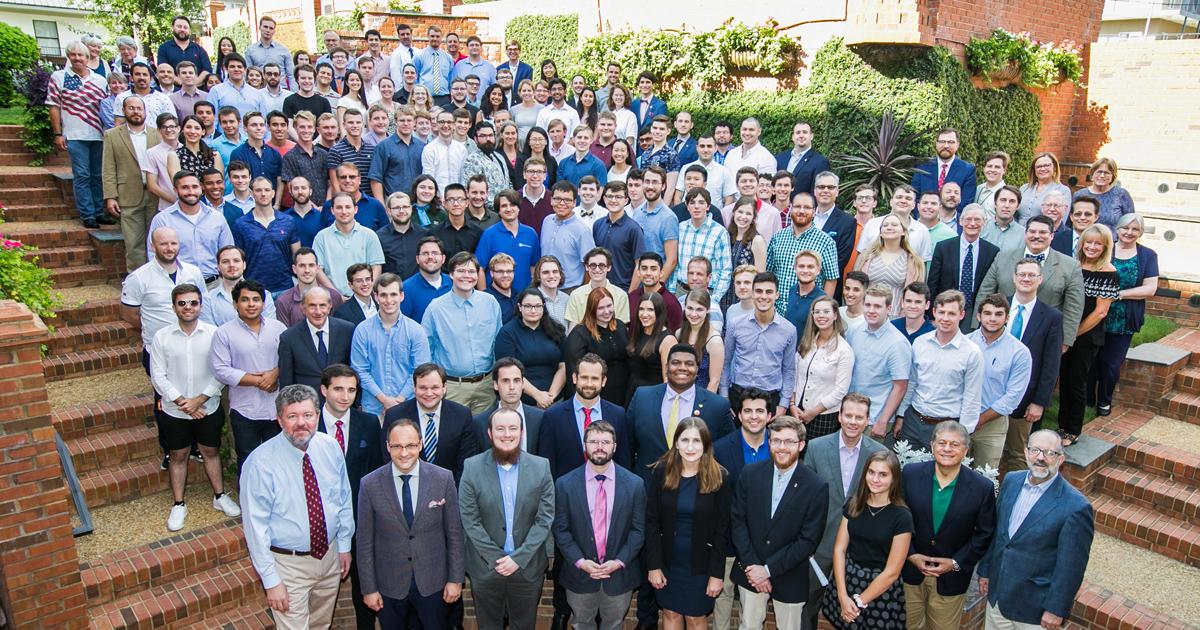
What They Must Learn Now
Twenty twenty was the year college changed forever. How many US universities have been mortally wounded?
Covid was the pretense. But the writing was on the wall for decades. Skyrocketing tuition. Useless majors and degrees. Leftist ideologues masquerading as professors. Woke curricula instead of rigor and truth. Many students leave with tens or even hundreds of thousands of dollars of debt. And for countless graduates, little to show for it all in terms of marketable skills or job prospects.
The Mises Institute, in stark contrast, held one of its most successful Mises University programs in 2020. And we need your help to reach more and more young people before their professors ruin them!
Most universities went online in 2020—condemning students to isolation and inferior teaching. Many are still online, but with no discount on tuition. Across the street from the Mises Institute, Auburn University charges over $30,000 per year for out-of-state students. Foreign students, mostly Chinese and Indian, are cash cows for the school, many spending over $200,000 for an undergraduate degree.
How long can this go on?
Mises University is the antidote to all of this. It is precisely the program every young person needs to jump-start their real education. It may well be more valuable to them than four years of traditional college. Please support our most important and vital outreach to students.
The ramifications of covid and lockdowns will be felt for years, and far beyond campuses. The virus has been an excuse for expanding state power more than perhaps any other time in decades. And younger generations will bear the brunt of the Great Reset narrative now being advanced by the political class across the West. Make no mistake, the propaganda is real and aimed squarely at those under thirty.
One harridan at the World Economic Forum insists that by 2030 Generation Z will “own nothing and be happy.”
No car.
No house.
No apartment.
No appliances or clothes.
No privacy.
Of course, transportation, healthcare, food, and accommodation will be “free.”
This is the absurdity they want young people to accept! A world without private property, family, or any of the civilizing institutions which stand between us and the state. It would rob an entire generation of their autonomy. And proponents use the oldest trick in the book to sell it, namely the idea of a world without scarcity.
This is not just countereconomics, this is antieconomics. It’s also evil and inhuman.
Young people are being bombarded with these kinds of messages. Mises University offers them a radical alternative: a week where civilization and truth reassert themselves. Please support this worthy program by making your most generous contribution today.
Take a look at the undergraduate course offerings at your state’s university. Take a look at the average young person’s social media feed. Or take a look, if you can stand it, at CNN for an hour.
Then compare and contrast that with what Mises U students study during their week with us:
- Praxeology. Economics is pure science, more like logic than the empirical natural disciplines. Mises developed a commonsense method of procedure for economics that he termed praxeology, directly contra the historicists and positivists. This understanding, at the core of the Austrian school, is almost entirely absent from university economics courses. Yet praxeology is critical to the epistemology of real economics.
- Metaphysics. What is the fundamental nature of reality? Is it objective? And how do we perceive it? Unlike undergraduate professors, our instructors are versed in and ready to tackle these fundamental questions, applying everyone from Aristotle and Kant to Menger and Mises.
- Philosophy. Our students learn the normative and utilitarian arguments for property, freedom, and peaceful human interaction from brilliant thinkers like Dr. David Gordon. Aquinas, Locke, Rothbard, and other great thinkers are introduced and considered.
- Statism, Anarchism, and Private Legal Systems. Students enjoy an unstinting survey of comparative political and economic systems, from Misesian liberalism to the worst tyrannies in history. Rothbard’s ethical case for laissez-faire and Hoppe’s argument against democracy both stand out as highlights for many of our students. Dr. Robert Murphy is among our most popular lecturers on the provision of services in a truly private society.
- The Division of Labor. Our differences—in talent, aptitude, and ability—form the basis for the whole social order. Trade, the civilizing and enriching force in society, happens precisely because we are different. The market brings us together through comparative advantage. Yet this daily global miracle is alternatively ignored or mocked by university professors. Not so for our wonderfully engaging expert Dr. Shawn Ritenour.
- Money and Banking. How does money arise? How does it obtain value? What is the function of interest rates? And are central banks necessary? None of these questions are asked, much less answered, in most undergraduate macroeconomics classes. Fractional reserve and free banking concepts are also explored, along with the role for a gold standard and the prospects for Hayek’s vision of denationalized money. Professors Joseph Salerno and Jeffrey Herbener are superstars in this area.
- Booms and Busts. What causes the business cycle, and why haven’t years of Fed technocracy solved the problem of recessions and depressions? Why do bubbles, from housing to stocks to student loans, keep recurring in our modern economy? Students learn the critical Austrian explanation for malinvestment and the resulting economic downturn, along with the role of expansionary fiduciary media. Dr. Mark Thornton literally wrote the book on how the cycle works and why, and he’s front and center with students all week.
- Entrepreneurship and Business Organizations. The Marxist, Keynesian, and neoclassical schools lack any explanation for the enormously important and salutary role of individual entrepreneurs in society. These are the innovators, those who put their own capital at risk against ever-changing conditions of uncertainty. Professors Peter Klein and Per Bylund are both respected experts in this neglected economic specialty, and open students’ eyes to the world of entrepreneurship.
- History. From the colonial period to the Progressive Era, from two world wars to the crash of 2007, US history as written and taught is hopelessly bowdlerized. Students need facts and causes for major events more than ever, to counter versions pushed by major media. Dr. Patrick Newman is a rising star in both US history and the history of economic thought, and brings his Rothbardian revisionism to life in his lectures.
- Social Interaction and Intellectual Growth. Last but not least are the wonderful social connections and friendships made at Mises U. Many attendees make lifelong friends, and networking with faculty takes place naturally. Some decide to make economics their life’s work after a week of immersion, and some decide professional or academic economics is definitely not their preferred path. Both decisions can be invaluable. And most of all, our students make the kind of intellectual leaps that are so rare in rote and listless undergraduate study.
As you can see, we might call the program “Civilization U.” Students are immersed in the foundations of Austrian economics, but also much more. They receive nothing short of a grounding in the foundations of a free society, from property and markets to social cooperation to peace.
I can’t emphasize enough how truly different and remarkable Mises U really is. Most college students don’t read books; our students almost invariably become avid readers for life. Most college students don’t much want to be there (beyond the partying); ours are eager to attend and often apply several times before being accepted! Most college students are there by default, because they have no particular interests and don’t know what else to do. Ours are self-selected, focused, and already motivated by a deep interest in economics and the workings of a free society. Most college students just want to know, “Will this be on the test?” Ours want to learn for learning’s sake, to better themselves and improve their knowledge.
It’s exhilarating and humbling to watch students grow and broaden their horizons at Mises U. There is nothing more important that we do. And we need your financial support to keep this program going.
We all want to make the world a better place and fight the illiberalism growing across our society. We all want to leave a better world for our children and grandchildren. And we all want a quick solution to what ails America and the West.
But there are no quick fixes. We have to attack the margins and save the world one young person at a time. We need to equip them with truth and real economics before they head off into academia, business, finance, media, the arts, or any walk of life. The way forward is to “present society with one improved unit,” as Albert J. Nock told us. That is exactly what Mises University is all about.
Mises U is entirely free to students, including lodging and meals. That’s why we spend well into six figures hosting them for a week. Only your ongoing support makes this incredible program viable.
Please make your most generous donation today.
Mises U is the best and most unique program of its kind in the world. Please lend your support.



